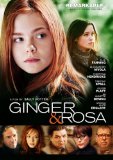| Reviews & Columns |
|
Reviews DVD TV on DVD Blu-ray 4K UHD International DVDs In Theaters Reviews by Studio Video Games Features Collector Series DVDs Easter Egg Database Interviews DVD Talk Radio Feature Articles Columns Anime Talk DVD Savant Horror DVDs The M.O.D. Squad Art House HD Talk Silent DVD
|
DVD Talk Forum |
|
|
| Resources |
|
DVD Price Search Customer Service #'s RCE Info Links |
|
Columns
|
|
|
Ginger & Rosa
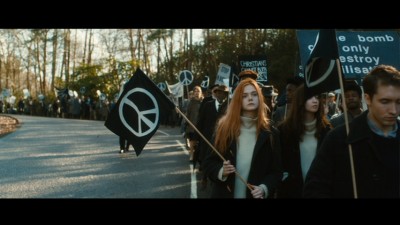
The British filmmaker Sally Potter burst onto the radar of cinephiles everywhere (giving Tilda Swinton her first big taste of well-deserved international stardom) in 1992 with her highly intelligent, highly sensual debut feature, the Virginia Woolf adaptation Orlando. Since then, Potter's career has progressed amid rather choppy waters; she's admirably refused to rest on her laurels or repeat herself, demonstrating with each unpredictable new project that true artist's dedication to challenge and resistance to coasting in any comfort zone. The downside of Potter's adventurousness and need to conquer new territory, though, is an overall overreaching and lack of quality control: There seem to be two noble failures in her filmography (e.g., 1997's The Tango Lesson and 2000's The Man Who Cried) for every post-Orlando unqualified artistic success (2004's rhyming/iambic pentameter-dialogued Yes, with which Potter recovered her mojo and actually proved herself a true poet of the word and image in the process). The latest genre Potter has taken on, in her new film Ginger & Rosa, is the period coming-of-age drama, for which she's gathered a remarkable ensemble of grown-ups (Mad Men's Christina Hendricks, the great Mike Leigh stock-company perennial Timothy Spall, Junebug's Allesandro Nivola, Annette Bening, etc.), all of whose characters are grappling with the shifting mores of the '60s, around Elle Fanning (Somewhere) as Ginger, the early-teenaged daughter of troubled, disenchanted wannabe-bohemian parents, whose awakening to the existential horror of The Bomb culminates with the Cuban Missile Crisis even as the radioactive elements in her own life, especially those involving her once-symbiotic relationship with her closest friend, Rosa (newcomer Alice Englert) perilously approach their own detonation point.
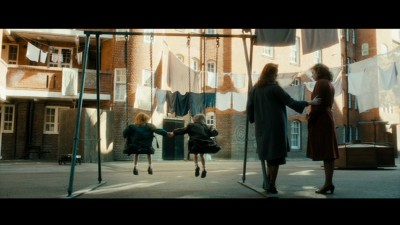
Potter does some lovely things with the surplus of talent she's amassed in her cast (and behind the camera, too, recruiting cinematographer Robbie Ryan to bring some of the same loose yet highly detailed, vibrant, eccentrically perceptive vibe he gave to two Andrea Arnold visual stunners, Fish Tank and Wuthering Heights). Hendricks and Nivola play Ginger's parents, a teacher and a housewife/ex-painter, both creative and intelligent (and even heroic; the father is a pacifist intellectual who went to prison for his beliefs during WWII), and they're both very good, fully inhabiting and humanizing their frustrated, flawed characters as they haplessly negotiate the last stages of their failing marriage and their precocious daughter's newfound obsession with atomic annihilation and increasingly militant involvement in the no-nukes movement. Ginger's household is prone to sophisticated dinner discussions with guests like Ginger's godfathers, a professor (Spall) and his partner, an American expat (Oliver Platt), who lately bring along their horn-rimmed, bluntly-speaking friend (Bening), a peace activist who encourages Ginger in her growing consciousness as the girl, in need of a female role model other than her discontented mother, saturates herself with music and poetry, and begins to develop her own gift with lyrical words. Rosa, who was born at the same time and place as Ginger (their mothers were close, pregnant and in labor at the same time; the friendship was, we infer and Potter convinces us, predestined) has no such luxury; she's one of many children her working-class mother has to raise, and her life is less stimulating, more hardscrabble than Ginger's. The girls share the same questions, longings, and doubts, but Rosa's stifled, insufficiently nurtured roots lead her not to sprout up and push through like Rosa, but to retreat and seek solace, in Catholicism and then in an unhealthy -- and criminally reciprocated -- crush on Ginger's handsome, brooding father, who's moved out of the house and chooses to sees his relationship with a vulnerable teenage girl as one more strike in his heroic history of bursting bourgeois shackles.
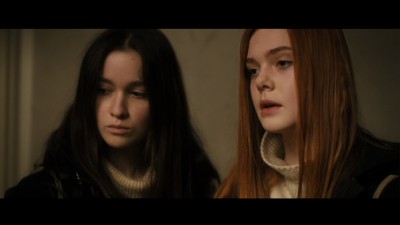
Ginger & Rosa is, then, the story of a sisterly friendship disrupted by class and cultural differences, subtle and inexpressible envies and resentments. Or is it the story of a man's weakness despite his pacifist heroism, rendering him not the ennobled martyr he feels himself to be but a fallible, disappointing human being like anyone? Or that of a frustrated woman's (Ginger's mother) liberation from a dead marriage she thought she needed? Or of the traumatic yet exhilarating birth, facilitated by painful ambiguities and life's hectic, jostling experience, of a poet? Potter actually does a fair job of juggling the teeming concerns and themes with which she's loaded her film (even if the analogy of total nuclear devastation is a nervy stretch to make with adolescent angst or a family's implosion, it's not leaned on too hard), mostly by, at least in the first two-thirds of the film, letting images (the girls, their clothes becoming ever blacker as they ponder the state of the world and their lives, doing believable, affectionately portrayed teenage things like reading poetry to one another and hanging out for deep thoughts at an abandoned amusement park; the candlelit dinner prepared by Ginger's mother having its precarious, contrived aura shattered by the harsh light of reality, in this case the prosaic illumination of a mundane old overhead electric bulb) economically and effectively (not to mention often very beautifully) conveying the many -- too many, if you really think about it, but Potter ably distracts us from that -- tensions and troubles of these people's lives.
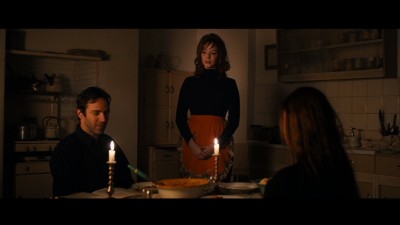
But Potter can't keep the plates spinning in a way that makes her overburdened movie forever. It turns out that what Potter is building toward with all of the very skillfully and compellingly executed, if overstuffed, groundwork is something that feels like nothing less than a betrayal of her vision (presuming, as the first part of the film allows us to, that she was aiming for insight, a humane excavation of her characters' contradictions, brought to the fore by a world whose dangerousness becomes ever more intrusive and unbearable). The film's concluding set piece is misguided, ghastly: A long, long scene in which Potter assembles all of her characters together through overly-expedient coincidence for an all-in-one unraveling of secrets and parade of unnecessary exposition (in which the blind spots of Ginger's father, the desperation of her mother, the strong but ill-advised romanticism to which Rosa has succumbed, and the tearing-apart it's all inflicting on Ginger come tumbling out in a shapeless, impotent jumble that neutralizes all potential emotional power). Potter is doubtlessly enough the cineaste to be appreciatively familiar with both the impressionistic flow of Terrence Malick (Days of Heaven, Tree of Life) and the ultra-heightened, artifice-intoxicated, formally gravity-laden melodramas of Douglas Sirk (All that Heaven Allows), but her experiment here in shoehorning the latter into the former only just falls short of irrevocably ruining Ginger & Rosa. The film recovers its bearings for an elegantly introspective, potentially quiet but powerful coda, but even that would've been more moving were it not placed in such stark, immediate juxtaposition with the surprise, clumsy shrillness preceding it. Instead, the effectiveness of this last, graceful touch serves more as a reminder of how well it matches the tone of the film that should've been (the one that didn't shatter the tone of its much better beginning and middle), and as a cause to wonder what made Potter drive her otherwise smart and interesting picture off the cliff of hamfisted soap opera.
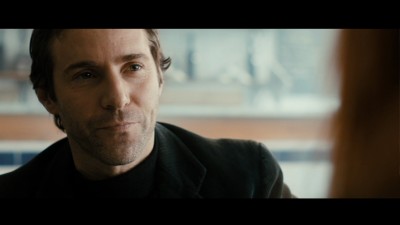
All of which is to say that Ginger & Rosa) is one of the most mixed cinematic bags you're likely to have come across in quite some time. This kind of thing is tricky to make any judgment call on: Wouldn't it be better to not see the film at all, to forgo both its substantial moments of emotional intrigue and aesthetic pleasure and the rotting, creaky elements that undermine all that promise? To avoid both the tantalizing potential on display and the sharp disappointment when it's finally squandered? In this case, on the whole, no; Potter's gift is such that anyone who love the movies won't want to deny themselves the gratifications of what's good about this film just because its accomplishments raise the artistic stakes high enough that its shocking failures seem all the more glaring when they arrive and threaten to infest and eat away at anything we've found revelatory or transporting. There's enough here, if only just, to make it a worthy missed stab at something consistently fine, a reason to keep hoping Potter is more rigorous and gets the balance right next time. It's painful to experience her passionate and inspired filmmaking get waylaid as catastrophically as it does this time, but in the end, it's better to have loved Ginger & Rosa and lost than never to have loved it at all.
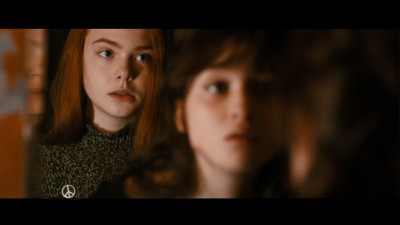
Video:
This anamorphic-widescreen (2.40:1 aspect ratio) presentation of Ginger and Rosa is very good for standard-definition (though it is surprising that such a visually arresting picture wouldn't get a Region 1 Blu-ray release as well). Ryan's vivid, vibrant color cinematography is done full justice here, with the variegations in light and contrasts of shade coming through very solidly and in good detail, with no compression artifacts other than some very minor, barely noticeable edge enhancement and a judicious finger on the digital noise reduction (DNR) button and other potentially flattening clean-up processes leaving plenty of the film's cinematic texture intact.
Sound:The sound set-up offers Dolby Digital 2.0 stereo or Dolby Digital 5.1 surround tracks. The surround sound is crystal-clear, detailed, and sonorous at every high and low range, all ambient sound making its appropriate but unobtrusive impact, and all dialogue immediately present, distinct, and solid, with no imbalance or distortion.
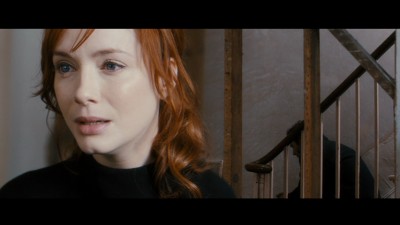
Part of the reason I'm giving this disc a "recommended" rating instead of a mere "rent it" is because the extras are very generous, quite unusually so (I've been much better films released to DVD with much skimpier and more blah extras); the insights into filmmaking provided by the delightful, respectful but honest and not sycophantic (that being a major problem with far too many back-slapping, fake-smiling featurettes and things) cast and crew across these supplemental materials, when added to what does work in a fatally flawed film, makes this DVD more arguably worth having than it would have been otherwise. (The generosity of spirit that loaded all of these worthwhile bonuses onto the disc is matched by Potter's own perfect balance of intelligence, passion, and the sincere conscientiousness of her thinking and affection for her collaborators that comes through in her appearances on these extras; I can't feel certain that every film she makes will be a good one, but after what we get here, I do know I want to take an aesthetics-of-cinema and/or filmmaking seminar from her.)
--Feature audio commentary with director Sally Potter, which is a delight to listen to, actually; Potter is in no rush to fill up every second with the sound of her voice, but she speaks consistently enough throughout, and what she has to say (about the story, about the filmmaking process, about her memories of this or that day and what she intended the scenes to mean, whether they succeed in our estimation or not) is never less than incisive and revealing about the care -- worth waiting through her thoughtful pauses.
--"The Making of Ginger & Rosa," a half-hour making-of directed by interloper Joseph Matthews, which is pleasingly forthright and revealing about the hurry-up-and-wait absurdities of making a film at the same time it's deeply affectionate toward this particular production. Matthews's voice-over starts out seeming a bit soliloquizing and self-indulgent, but his ruminations quickly become relevant and insightful enough to add something. It's one of the better, more thoughtful, less obligatory-feeling makings-of I've seen in a while.
--"Anatomy of a Film" (60 min. approx.), a person-by-person rundown, from Potter herself all the way to the second A.D. and featuring every principal crew member from the producer to the art department, cinematographer, and sound design, etc., in between. This is good, engaged and engaging, highly informative stuff for anyone who likes discovering the ins and outs of how a film has actually been made; it really sheds some practical yet engrossing light on the intricate step-by-step, coordination, and logistics of not just this film, but a great deal of contemporary filmmaking.
--About 35 minutes of one-on-one interviews with the cast, comprising everyone from the effusively American-teenaged Fanning (Within the difference between her real, endearingly giggling and youthful persona and the heavier personality she delivers onscreen as Ginger lies a highly-developed, precocious actor's skill) to Nivola to Hendricks to Englert to Bening to Platt and Spall, each sharing their own thoughts on the script and the filming process, working with Potter, what their characters mean to them, and generally rounding out even further the cornucopia of good supplemental material on the film to be found here.
--Deleted Scenes that are actually just one five-minute deleted scene (a good one, both as a finely crafted stand-alone bit of filmmaking and as an example of what gets streamlined out for various solid reasons, however good it is), but you don't mind because it's preceded by an introduction by Potter of equal length, explaining very accessibly and fascinatingly what it's like to be in the editing room and making difficult sacrifices of very good, very well-executed parts of your long-honed vision for the greater good of the whole.
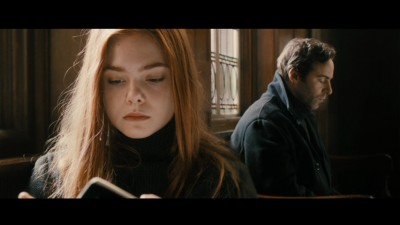
An interesting, often absorbing, principally intelligent film that loses its way and falls far short of its potential, Sally Potter's Ginger & Rosa is the kind of initially rather successful and captivating, then egregiously disappointing drama only someone with Potter's considerable talent and ambition could have made. Its main, near-terminal flaw is that Potter, in the final quarter or so of the movie, reveals her weakness as a (melo)dramatist in a big way, sucking the wind out of the sails of a concept (smart, free-spirited adolescent girls in the early '60s, developing their values and moral compasses against the backdrop of nuclear terror and the Cuban Missile Crisis) and style (detailed, sensuous, loose, roving, lyrical) that are right up her alley. The film ultimately overdoses on the most conventional, reductive, contrived and predictable revelations and denouements, handled leadenly by Potter's script and making for a total mismatch with the subtlety and fine instinct she displays in it elsewhere. When the film works, though, it has a true, complex feel for the era and the time of life it means to (and does well, up to a certain point) explore; it's really only a half-good movie, but what's good about it is worth seeing (especially for Potter fans, who won't want to miss it despite its compromises), even if it's a big tease in the end, proffering as it does only a tantalizing, finally sullied glimpse of what might have been had the uniquely talented but often too undisciplined Potter stayed truer to her story's tender, fraught, exploratory, and conflicted teenage heart. Recommended.
|
| Popular Reviews |
| Sponsored Links |
|
|
| Sponsored Links |
|
|
| Release List | Reviews | Shop | Newsletter | Forum | DVD Giveaways | Blu-Ray | Advertise |
|
Copyright 2024 DVDTalk.com All Rights Reserved. Legal Info, Privacy Policy, Terms of Use,
Manage Preferences,
Your Privacy Choices | |||||||









